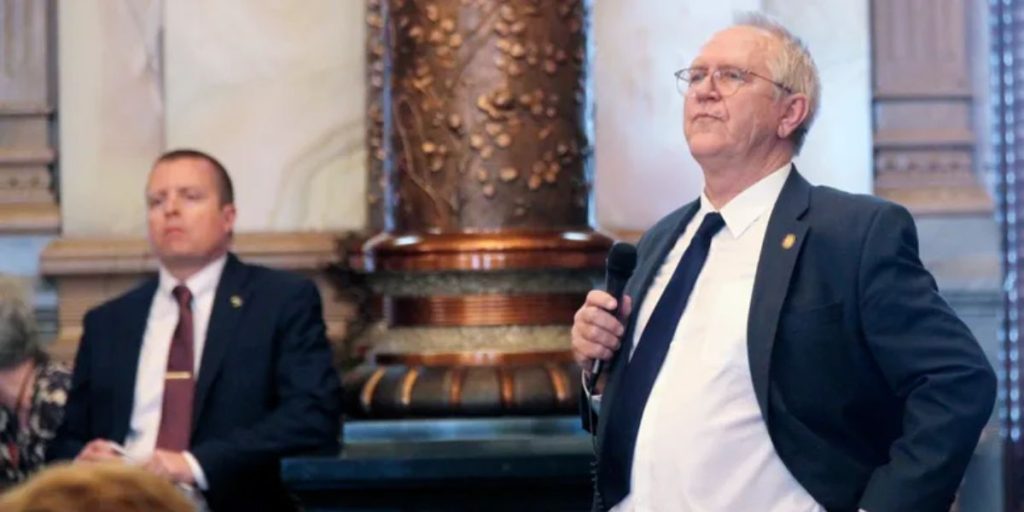Republican legislators in Kansas are on the verge of prohibiting gender-affirming care for minors despite the Democratic governor’s predicted veto, raising concerns that success may embolden additional moves to restrict transgender rights.
The Republican-controlled state Senate is poised to pass a bill Thursday that would prohibit healthcare practitioners from treating a child’s gender dysphoria with puberty blockers, hormone therapy, or surgery, and would strip doctors who violated the restriction of their licenses. The bill passed the GOP-controlled House on Wednesday, and Senate passage would send it to Gov. Laura Kelly.

At least 23 additional states with Republican legislatures have limited or prohibited gender-affirming care for adolescents. Last year, Kansas lawmakers sought to establish a ban but were unable to assemble the two-thirds majority required to override Kelly’s veto. However, at least a dozen Republicans who earlier opposed it are now supporting it.
“When I was out and about last summer and fall, and the number of emails and calls that I had, I didn’t have a single one tell me to vote the same way I did last year,” said state Rep. Susan Concannon, a Republican from western Kansas, on Thursday.
While supporters say they are concerned about safeguarding children, the Kansas bill has raised fears among transgender individuals and LGBTQ+ advocates that GOP lawmakers would seek additional restrictions next year, as they have in other GOP-led states.
While Ohio’s state government reversed its decision to limit adult care last month, a Florida statute geared at child care in 2023 also restricted adult care, as did a Missouri measure that was only temporary.
“The goalposts are not firm,” said Iridescent Riffel, a 27-year-old transgender Lawrence resident and LGBTQ+ rights activist who has opposed the legislation. “They will always continue to be moved further and further right.”
Opponents of such limits in Kansas have already threatened a legal challenge if they are imposed. Courts in Arkansas, Idaho, and Montana have barred the implementation of bans, but Alabama and Georgia have allowed them to be enforced.
Laws that restrict or prohibit gender-affirming care contradict the advice of major medical associations in the United States, such as the American Medical Association and the American Academy of Pediatrics. Suppliers of the care claim it saves lives by reducing despair and anxiety, which can lead to suicide.
Young transgender individuals and parents of transgender or non-binary children in Kansas also told lawmakers that gender-affirming care is critical to their health and that clinicians did not rush their decisions and were upfront about potential consequences.
Anthony Alvarez, a 20-year-old transgender University of Kansas student, said he had to wait many months after a doctor agreed to give his testosterone treatments to get an additional evaluation to ensure he was certain he wanted them.
He was looking forward to deepening his voice and developing facial hair, and he hopes to have the double mastectomy known as “top surgery” in December. He claims he is considerably happier since his transition because the despair and anxiety that plagued his life before have subsided.
“Those aren’t the things that cause gender dysphoria. In an interview, he explained that they are caused by gender dysphoria, which is a reaction to a reality that is hostile to you.
However, Republican politicians paint puberty blockers and hormone therapy as too dangerous for minors. Top Republican House leaders in Kansas stated in a statement Wednesday that they were working to prevent irreversible harm from “experimental” treatments.
Backers of the bill referenced a statement this week from the National Health Service in England, which stated that “there is not enough evidence” that puberty blockers are safe and effective to “make the treatment routinely available,” a claim that US healthcare providers reject. The NHS announcement follows an interim policy implemented last year.
In a meeting of GOP senators early Thursday, Senate Health Committee Chair Beverly Gossage, a Kansas City-area Republican, began a briefing on the measure with the phrase, “It’s talking about children.”
After absent supporters were counted in Wednesday’s House vote, advocates appeared to have the 84 votes required to override a veto. Last year, a dozen members who voted “yes” voted “no”.
“Philosophically, I didn’t change my mind at all,” said Jim Minnix, a Republican state representative from western Kansas. “The bills this year were, in my opinion, better written and far better targeted.”